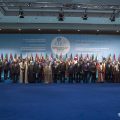
ERBIL, Iraq — After arriving in Baghdad on Monday afternoon, Jared Kushner, President Trump’s son-in-law, met with Prime Minister Haider al-Abadi to discuss the fight against the Islamic State and whether the United States would leave troops in Iraq afterward, according to a spokesman for the prime minister.
Mr. Kushner, a senior adviser to the president, traveled to Iraq along with Gen. Joseph F. Dunford Jr., the chairman of the Joint Chiefs of Staff, as part of the general’s planned trip to discuss the battle against the Islamic State, also known as ISIS and ISIL.
Mr. Kushner was also expected to meet with officials from the United States-led military coalition and Iraq’s minister of defense, according to an Iraqi military spokesman. He was also accompanied by Thomas P. Bossert, Mr. Trump’s homeland security adviser.
As the first visit to Iraq by a senior member of Mr. Trump’s White House, Mr. Kushner’s arrival highlighted the president’s approach to foreign affairs of often relying on loyalists with little experience in matters of war and diplomacy.
Benjamin J. Rhodes, who was a foreign policy adviser to President Barack Obama, wrote on Twitter: “Kushner in Iraq before the National Security Advisor or Secretary of State. Totally normal.”
That was not the only way the trip broke with usual government practice: On Sunday evening, as word of Mr. Kushner’s trip began to spread, the White House incorrectly told reporters on background that Mr. Kushner was in Iraq before he actually landed. Usually, officials have insisted on not confirming news of high-level visits to combat zones until after the officials arrive, to keep them from becoming targets.
In 2007, for example, a suicide bomber for the Taliban attacked Bagram Air Base in Afghanistan during a visit by Vice President Dick Cheney, killing more than 20 people and wounding 20. Mr. Cheney was unharmed.
On Monday, a statement issued by Mr. Abadi’s office said that during the meeting, the American delegation “stressed its support to the government in its war against terrorism and expressed their admiration for the improved combat capabilities of the Iraqi forces as they achieve victories against ISIS.”
Saad al-Hadithi, a spokesman for Mr. Abadi, said in an interview that the officials discussed “the continuation of the cooperation to eliminate ISIS in Iraq and Syria, and also the training and arming of the Iraqi Army.”
The trip also seemed to represent another step, after a meeting between Mr. Trump and Mr. Abadi in Washington several weeks ago, to assure the Iraqis that the United States is a reliable ally, given that the relationship between the Trump administration and Iraq began on rocky footing.
First, in a speech at the C.I.A. shortly after his inauguration in January, Mr. Trump expressed regret that the United States had not taken Iraq’s oil after the 2003 invasion, and he suggested there still might be a chance to do so. Then, he placed Iraq on a list of seven Muslim-dominated countries whose citizens were barred from traveling to the United States.
That ban was blocked by the courts and later replaced with a new one that did not include Iraq on the ban list. But Iraqis still view the initial listing as an insult at a time when the two countries are working together to fight the Islamic State in the battle for Mosul.
Iraq may yet take on greater importance for the Trump administration than just its part in the fight against the Islamic State. With administration officials having signaled a desire to take a tougher stance on Iran, which like Iraq is majority Shiite and whose power inside Iraq is paramount, Iraqi officials have worried that their country could again become a place for the two foreign powers to settle their differences.
After the American invasion of 2003, Iraqi Shiite militias aligned with Iran killed hundreds of Americans, and those same militias have taken on an important role in fighting the Islamic State. They are now essentially a parallel security structure within the state, even though they are directed by Iran.
There are already signs that the Trump administration sees Iraq as a place to push back on the growing power of Iran across the region, where Tehran has expanded its power through proxies in four countries: Iraq, Syria, Lebanon and Yemen. In late February, for the first time in years, the foreign minister for Saudi Arabia, a Sunni power and Iran’s chief regional rival, visited Baghdad in a trip encouraged by American officials.
That was seen by Iraqi officials as a signal by the Americans that they are intent on nudging the Saudis to take a stronger role in Iraq, whose Sunni minority has been alienated from the power centers of Baghdad. But Iraqi officials have said they worry that that will only exacerbate sectarian tensions in Iraq, and that the last thing the country needs is more foreign meddling.
The visit by Mr. Kushner came about a week after the Pentagon acknowledged that airstrikes in a neighborhood of Mosul may have mistakenly led to scores of civilian deaths — as many as 200, according to Iraqis.
Though the battle to take that Iraqi city away from the Islamic State remains difficult, and may stretch for months more, the focus for the Trump administration will increasingly turn to what comes next.
The White House will have to decide whether to remove the thousands of American troops that returned to Iraq after the Islamic State seized Mosul in 2014 or to leave some behind to continue training the Iraqi Army and assisting in counterterrorism missions.
Mr. Trump has given mixed signals on this subject, at once vowing to end costly military missions abroad while, as a candidate, criticizing Mr. Obama for withdrawing all American troops from Iraq at the end of 2011. He has said that decision created a vacuum that allowed the Islamic State to thrive, eventually take over a third of the country and establish a base from which to carry out terrorist attacks in the West.


